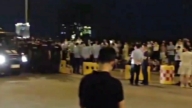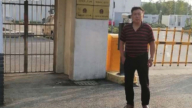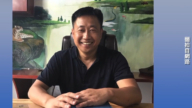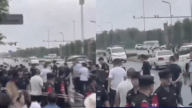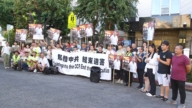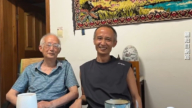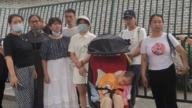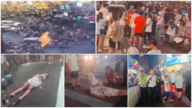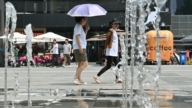【新唐人2014年02月26日讯】中共当局24号发布的《2014年中国法治发展报告》说,从2000年到2013年的14年间,中国大陆共发生百人以上的群体性事件871起,还说:劳资纠纷是引发群体事件的第一大原因。不过,以图表形式发表的报告并没有得到人们的认可,维权人士则认为资料太夸张,而且转移了群体事件的实质。请看报导。
中共社科院法学院研究所公布的《2014年中国法治发展报告》,据负责人介绍说,这份报告是对近14年间的群体性事件特点,进行了梳理,所有的统计资料来自国内正式出版发行的纸媒和网路媒体报导。
报告还说,群体性事件参与者在一千人到一万人之间的有271起,万人以上的有十起。从地域来看,广东发生的群体性事件最多,约占30%。
但是,早在2011年8月,美国《华尔街日报》就引述北京“清华大学”教授孙立平的话说,中国在2010年,发生了“18万”起的群体事件,而且在最近10年间增加了3倍。孙立平是中共现任领导人习近平的博士论文导师。
北京社会活动家、维权人士胡佳也表示,社科院的资料太夸张了,与现实差距太远。
北京社会活动家、维权人士胡佳:“你就到国家信访局门口去、你待着,你就会发现某些省市,尤其东北那边来的、还有从上海来的,都是百人以上的那种上访团,有的是为同一诉求来的,好几百人同时到。”
胡佳表示,在北京每天都有很多人集结,要求社会给予公正,但这些在媒体中是看不到的。
24号,广东省江门市新沙村的村民堵路抗议征地款被贪,遭上百警察镇压,多人被抓捕;四川成都国际商贸城数百商户游行示威,遭300警察镇压,约10名商户被抓捕;河南省安阳出动200警察强行清场,把那些因为医疗事故而示威的多名死者家属抓走。那一天,江苏省启东市也发生了因医疗事故致死家属示威,遭警察殴打的事件。
同一天,上海市外高桥保税区,还发生了“住化电子厂”200女工维权事件,和天津”赫比电子有限公司”工人罢工等一系列事件。
胡佳指出,共产党从来就没有停止过制造社会矛盾,而且还在时时加剧社会矛盾,这就造成走上街头的人只可能是越来越多、频率越来越高。
社科院的报告还提出,维权类的群体事件占最多,约55%。其中,因劳资纠纷引发的事件超过了30%。
四川“六四天网”网站创办人,维权人士黄琦指出,维权类占据群体事件的多数是对的,但把劳资纠纷说成是引发群体事件的主因,则是不准确的,因为这淡化了官民之间的矛盾。
大陆“六四天网”网站创办人黄琦:“据我所知和天网统计的资料,因拆迁、征地问题引发的群体事件,应该不低于60%以上。而其他一些事件主要是涉及一些城管和一些工人的讨薪事件等等。”
黄琦表示,中共通过强征、强拆,将农民的财产缩水,幅度大到90%以上,这就导致民不聊生的民众必然站出来群体反抗。同时强征、强拆涉及的人数众多,所以当局在这一系列的行动当中,积累了大量的民怨。现在民众的维权运动已经波及到了全中国。
2012年,黄琦估计,中国大陆最近十年来因拆迁征地,造成农民伤亡的人数至少不下十万。
另外,大陆《民生观察工作室》的统计资料显示,去年在强拆和强征过程中,致人死亡的案例达到16起;而仅在无锡市,截至2012年底,就有50多人因非法拆迁被迫害致死。
今年1月,中共总书记习近平在中央政法工作会议上强调,要处理好维稳和维权的关系,要把群众合理合法的利益诉求解决好。
这样看来,中共当局早已知道发生群体事件的背后原因所在。
采访/朱智善 编辑/宋风 后制/钟元
Only 871 Mass Incidents in The Last 14 Years Nationwide –
Hard to Believe!
The 2014 China Rule of Law Development Report released
on February 24 2014 by the Chinese Communist Party (CCP)
indicates there were 871 incidents involving more than 100
people across China from 2000 to 2013.
It also indicates labor disputes are the
top reason for group incidents.
However, people do not acknowledge this dashboard report.
Activists argued that the information is untrue and it twists
the nature of group events.
CCP Academy of Social Sciences (CASS) Institute of Law
published the 2014 China Rule of Law Development Report.
According to the person in charge, the report analyses
characteristics of mass incidents in the past 14 years,
and all data is from China’s print media and online media.
The report also indicates there were 271 mass incidents
involving 1,000 to 10,000 thousand people, and ten mass
incidents involving over 100,000 people.
From the geographical point of view, Guangdong Province
had the most group events, accounting for about 30%.
However, as early as August 2011, U.S. Wall Street Journal
quoted Qinghua University professor Sun Liping’s statement
that 180,000 mass incidents occurred in China in 2010, and
the number of mass incidents tripled in the past ten years.
Sun Liping was the doctoral dissertation supervisor
of current CCP leader Xi Jinping.
Beijing social activists and human rights activist Hu Jia
also expressed doubts of the report issued by the Academy
of Social Sciences, thinking it is far from reality.
Hu Jia: “You can go to the State Bureau of Letters and Visit
You can see groups of over 100 people appealing together,
especially from the North East. Some are from Shanghai.
Some groups came for the same reason.
Hundreds of people arrive together.”
Hu Jia said many people gather in Beijing every day
asking for justice. These cannot be seen via the media.
On February 24, villagers of Xinsha Village, Jiangmen City
of Guangdong Province protested against their lands
being taken away by blocking local roads.
They were repressed by hundreds of policemen.
Many were arrested.
In Chengdu City of Sichuan Province, hundreds of merchants
at the International Trade City took to the street to protest.
They were repressed by 300 policemen.
About 10 merchants were arrested.
In Anyang City of Henan Province, 200 policemen forcibly
dismissed protestors and arrested family members of dead
patients protesting about medical malpractice.
On the same day, similar events happened in
Qidong City of Jiangsu Province.
Family members of dead people were beaten by the police
for protesting at medical malpractice.
On the same day, 200 female workers at Zhuhua Electronics
Factory in Shanghai Waigaoqiao Free Trade Zone defended
their rights.
Workers at Tianjin Hi-P Electronics Co. went on strike.
Hu Jia pointed out the CCP never stopped making and
intensifying social conflicts, leading to more people taking
the street more frequently.
CASS report also suggested that the majority of
group incidents, about 55%, were to defend rights.
Labor disputes triggered more than 30% of group events.
64tianwang.net founder and activist Huang Qi pointed out
a majority of group events are due to defending rights.
The statement that labor disputes are the main cause
of mass incidents is not accurate, as it is weakened by the
conflicts between officials and the public.
Huang Qi: “According to the materials of 64tianwang.net,
more than 60% of mass events are due to forced demolition
and relocation and land acquisition.
Others are related to city management
and workers asking for salaries.”
Huang Qi said the CCP reduced farmers’ assets by 90%
by forced demolitions and land acquisition.
Farmers with hard lives have to stand up to protest.
Meanwhile forced demolitions impact many people,
so the authorities accumulated a lot of grievances.
People rights defending movement has now
spread all over China.
Huang Qi estimates in 2012 at latest 100,000 people were
injured or killed during forced relocation and demolition.
Data from China’s People Observance Work Room indicates
10 cases of death due to forced relocation and demolition.
In Wuxi City, over 50 people were killed due to forced
demolition and relocation by the end of 2012.
In January 2014 the CCP general party secretary Xi Jinping
emphasized during CCP Political and Law Committee
working sessions how to handle the relationship between
stability maintenance and rights activists.
This would bring good results to peoples’legal
rights and reasonable requests.
So the CCP seems to have been clear on the
reasons behind mass incidents.
Interview/Zhu Zhishan Edit/SongFeng Post-Production/ZhongYuan


